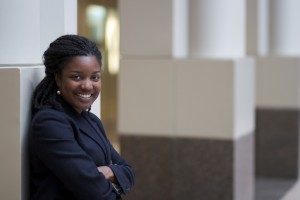Home » Alumni » Meet An Alumnus: Shanelle Chambers
Meet An Alumnus: Shanelle Chambers
Posted by herrodl on Tuesday, February 10, 2015 in Alumni, Alumni.
We put the spotlight on 2008 CDA Alumna Shanelle Chambers and learned about her work with USAID.
Q: Just for starters– where are you from originally and what year did you graduate from CDA? Any fun facts we should know? A: I am originally from Columbus, Ohio but have been living in D.C. for the past six years. I graduated from the CDA program in May 2008 and before that, I lived in Atlanta Georgia, completing my B.A. at Spelman College in 2006. Hmm a fun fact…. I will be getting married in six weeks – November 1! Q: Where do you work and what do you do?
A: I work for the U.S. Agency for International Development (USAID) in the Bureau for Africa. Specifically, I am a Country Development Officer (CDO) within the Office of East African Affairs, covering Ethiopia. My job entails: 1) information sharing, providing country specific information and expertise to a range of U.S. stakeholders on a variety of development and humanitarian assistance projects (e.g, agriculture, democracy and governance, disaster relief, education, health, etc) based in Ethiopia, 2) advocacy, representing USAID’s office in Ethiopia by supporting their programmatic and operational needs by being their voice in Washington, 3) liaising with interagency and development stakeholders – within USAID and the US government as well as with academic institutions, think-tanks, NGOs, multilateral banks, and the development community.
Q: How did you get involved in your work?
A: My interest in international development theory and policy was certainly piqued while completing CDA coursework and public policy electives (International Orgs and Econ Development was one of my favorites) within Peabody. After graduation, I pursued a career in community development and public policy in DC, first working as a Monitoring and Evaluations Specialist within the U.S. Department of Justice’s Office of Community Oriented Policing. There I conducted site visits and performed evaluations on community development public safety programs throughout the U.S. and territories. I maintained my interest in international development by engaging with the foreign affairs community, attending events, lectures and regularly reading journals/reports. When a CDO position opened within USAID’s Africa Bureau, I was able to utilize my educational background as well as my experience working with federal agencies and development programs to transition to a career in international development.
 Q: What stands out as your biggest take away from your time at CDA? How does that relate to your work? A: Development policies/projects are NOT one-size-fits-all! Further, the program development phase should be iterative, ever changing and flexible to respond to evolving environments and priorities. My CDA coursework is certainly to thank for this perspective. I am dangerously close to sounding like a broken record when providing input on projects but it is imperative that development practitioners keep this in mind. Whether assessing mother-tongue integration in early grade reading projects, investing in livestock for dairy value chains, or engaging civil society on governance issues, it is VITAL to maintain a country, regional, and cultural frame of reference.Q: What advice would you give to others who want to get involved in your issue-area or work?
Q: What stands out as your biggest take away from your time at CDA? How does that relate to your work? A: Development policies/projects are NOT one-size-fits-all! Further, the program development phase should be iterative, ever changing and flexible to respond to evolving environments and priorities. My CDA coursework is certainly to thank for this perspective. I am dangerously close to sounding like a broken record when providing input on projects but it is imperative that development practitioners keep this in mind. Whether assessing mother-tongue integration in early grade reading projects, investing in livestock for dairy value chains, or engaging civil society on governance issues, it is VITAL to maintain a country, regional, and cultural frame of reference.Q: What advice would you give to others who want to get involved in your issue-area or work?
A: Network and get involved in international policy in any way that you can. The best way to learn is to “do”. Take advantage of CDA’s action-oriented curriculum and get involved in a community intervention or action research project. Also keep in mind that there are a number of opportunities for involvement after graduation. Prior to joining USAID, I was active in Washington DC’s Society for International Development group and also regularly attended and participated in events and lectures at the Woodrow Wilson Center, Brookings Institute and a variety of other orgs in DC. I also recommend gaining experience within a federal agency by internship or working with an implementing partner as fluency in “bureaucra-neese” will be enormously helpful. Finally, keep reading! If you’re interested in this field, know that it is fast-moving and ever-evolving so take time to review policy summaries, flip through the Economist/Foreign Affairs, and find out what those in the industry are reading.
Tags: Alumni

Connect with Vanderbilt
©2026 Vanderbilt University ·
Site Development: University Web Communications